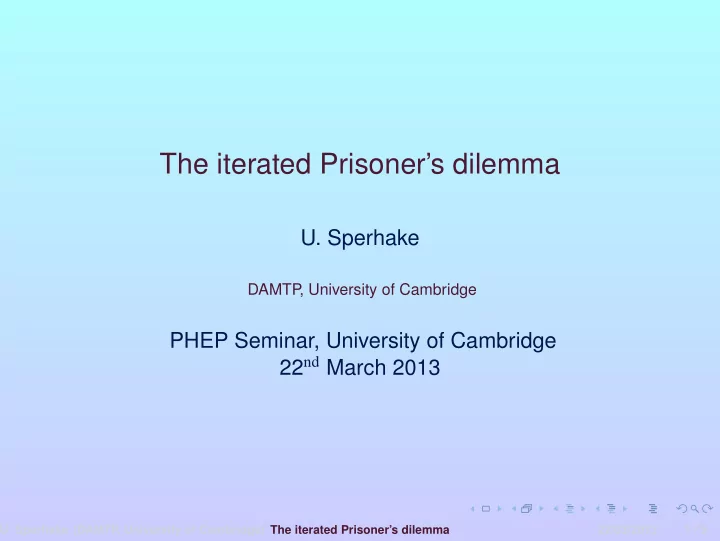

The iterated Prisoner’s dilemma U. Sperhake DAMTP , University of Cambridge PHEP Seminar, University of Cambridge 22 nd March 2013 U. Sperhake (DAMTP, University of Cambridge) The iterated Prisoner’s dilemma 22/03/2013 1 / 9
The prisoner’s dilemma Ernie & Bert have comitted a crime They are caught, sparse evidence They are separately interrogated Either confess or deny 4 possible outcomes Both confess (defect!) ⇒ Both get punished Both deny (cooperate!) ⇒ Both get light punishment (evidence!) Ernie denies, Bert confesses ⇒ Ernie free, Bert punished hard Vice versa U. Sperhake (DAMTP, University of Cambridge) The iterated Prisoner’s dilemma 22/03/2013 2 / 9
The prisoner’s dilemma payoff matrix T = Tempation payoff R = Cooperation reward P = Punishment S = Sucker’s payoff T > R > P > S Optimal strategy: defect! Problem: No communication... U. Sperhake (DAMTP, University of Cambridge) The iterated Prisoner’s dilemma 22/03/2013 3 / 9
The iterated prisoner’s dilemma (IPD) Play an unknown number of rounds; accumulate reward “points” A strategy can choose based on past moves of either player Example strategies: Saint: Always cooperate Defector: Always defect Random: 50/50 random choice Grim Trigger: Cooperate until oponent defects; from then on defect always Tit for Tat: Cooperate in the first round; then always do what the opponent did in the previous round Tit for Two Tats: As TFT, but allow two defections U. Sperhake (DAMTP, University of Cambridge) The iterated Prisoner’s dilemma 22/03/2013 4 / 9
Axelrod’s tournament R. Axelrod, late 1970s Invited game theorists to submit strategies Most were more complicated... And the winner is: U. Sperhake (DAMTP, University of Cambridge) The iterated Prisoner’s dilemma 22/03/2013 5 / 9
Axelrod’s tournament R. Axelrod, late 1970s Invited game theorists to submit strategies Most were more complicated... And the winner is: Tit for Tat; U. Sperhake (DAMTP, University of Cambridge) The iterated Prisoner’s dilemma 22/03/2013 5 / 9
Axelrod’s tournament R. Axelrod, late 1970s Invited game theorists to submit strategies Most were more complicated... And the winner is: Tit for Tat; Tit for two Tats would have won... U. Sperhake (DAMTP, University of Cambridge) The iterated Prisoner’s dilemma 22/03/2013 5 / 9
Axelrod’s tournament R. Axelrod, late 1970s Invited game theorists to submit strategies Most were more complicated... And the winner is: Tit for Tat; Tit for two Tats would have won... Key attributes Nice: Do not start defecting Retaliating: Don’t be a sucker Forgiving: Return to cooperation if appropriate Non-envious: Don’t try to outscore your opponent U. Sperhake (DAMTP, University of Cambridge) The iterated Prisoner’s dilemma 22/03/2013 5 / 9
Accidents happen... Random noise ⇒ occasionally invert player’s decision Bad for TFT ⇒ Endless cycle of recrimination Chinese Embassy, Belgrade Favors more forgiving strategies: Tit for N Tats Note: [ lim N →∞ Tit for N Tats ] = Saint U. Sperhake (DAMTP, University of Cambridge) The iterated Prisoner’s dilemma 22/03/2013 6 / 9
Societal collapse and order Nowak & Sigmund 1990s Population of strategies Reward: Offspring ⇒ adjust proportions Plenty of defection TFT eliminates defectors With few defectors, noise favors TFNT with increasing N These near Saints are vulnerable to exploitation by defectors... U. Sperhake (DAMTP, University of Cambridge) The iterated Prisoner’s dilemma 22/03/2013 7 / 9
Pavlov’s Victory In the long run societies are often dominated by Pavlov Start by cooperating win-stay, loose-switch, i.e. Change choice if I get a “sucker’s payoff” or “punishment” If by accident it gets away with exploitation, it does so! What makes Pavlov strong? It does not police as well as TFT But, as TFNT get soft, Pavlov ruthlessly exploits near Saints Yet, Pavlov is perfectly cooperative with copies of itself U. Sperhake (DAMTP, University of Cambridge) The iterated Prisoner’s dilemma 22/03/2013 8 / 9
Conclusions Altruism is NOT the opposite of selfishness Communication vital for establishing cooperation In the IPD, stay nice, simple, retaliating and yet forgiving Noise complicates life! Defectors are bad and so are Saints TFT needed for policing, Pavlov needed to weed out Saints U. Sperhake (DAMTP, University of Cambridge) The iterated Prisoner’s dilemma 22/03/2013 9 / 9
Recommend
More recommend